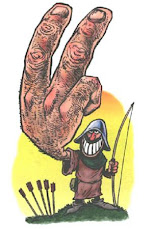I see loads of rubbish about how the Second Amendment allegedly means that "the people" have a right to rebel against the Constitutionally created government.
Usually this neglects Article 3, Section 3: Treason against the United States, shall consist only in levying war against them, or in adhering to their enemies, giving them aid and comfort.
Quick question how does the Second Amendment negate Article 3, Section 3 and allow for citizens to wage war against the US government?
Of course, people who buy into the RKBA myth usually neglect logic such as that.
Anyway, here are some quotes from the founders about rebelling against an elected government.
"Rebellion against a king may be pardoned or lightly punished, but the man who dares to rebel against the laws of a republic ought to suffer death." Samuel Adams about Shay's Rebellion
"I would infinitely prefer a limited monarchy, for I would sooner be the subject of the caprice of one man than the ignorance of the multitude." Noah Webster
"I am mortified beyond expression when I view the clouds that have spread over the brightest morn that ever dawned in any country... What a triumph for the advocates of despotism, to find that we are incapable of governing ourselves and that systems founded on the basis of equal liberty are merely ideal and fallacious." General George Washington about Shay's Rebellion.
James Madison once described democracy as the “most vile form of government”. In Federalist Paper No. 10, he had the following to say about democracy:
“A common passion or interest will, in almost every case, be felt by a majority of the whole; a communication and concert result from the form of government itself; and there is nothing to check the inducements to sacrifice the weaker party or an obnoxious individual. Hence it is that such democracies have ever been spectacles of turbulence and contention; have ever been found incompatible with personal security or the rights of property; and have in general been as short in their lives as they have been violent in their deaths.”
Alexander Hamilton, in a June 1788 speech urging his fellow New Yorkers to ratify the Constitution: “It has been observed that a pure democracy if it were practicable would be the most perfect government. Experience has proved that no position is more false than this. The ancient democracies in which the people themselves deliberated never possessed one good feature of government. Their very character was tyranny; their figure deformity.”
Samuel Chase, a signer of the declaration of independence and U.S. Supreme Court Justice, delivered a charge to a Baltimore grand jury in which he blasted Congress and the Jefferson administration for repealing the Judiciary Act of 1801 which unseated federal circuit court judges on 2 May 1803. He also lashed out at the Maryland legislature for eliminating property qualifications for the franchise and for interfering with the operation of Maryland's courts. Chase railed that America was risking a descent into "mobocracy," This led to his impeachment
Of course, you probably believe that the US is a democracy if you believe the Second Amendment allows you the right to wage war upon the US government.
11 October 2007
Subscribe to:
Posts (Atom)






